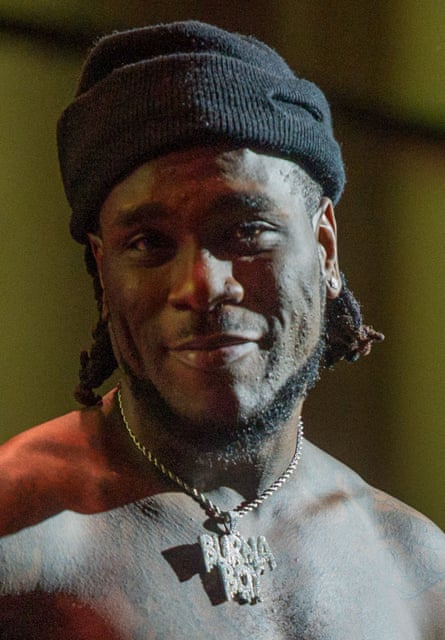In 2017, Luis Fonsi and Daddy Yankee’s huge No 1 summer hit Despacito seemed to herald a new age where the domination of the English language in western pop was eroding. Global streaming has since allowed for the overwhelming popularity of slick K-pop titans BTS, the doleful flamenco flourishes of Spanish artist Rosalía and the multilingual Nigerian superstar Burna Boy among others, suggesting that, at last, non-English-language hits are moving beyond novelties such as The Ketchup Song and Dragostea Din Tei.
But three summers on from Despacito, the UK remains dominated by English-language pop. Latin music hasn’t had nearly the same impact here as in the US, and Christine and the Queens’ “Ne me cherche pas, je ne suis plus la, baby” was a very rare burst of French on British radio, via Gone, her hit song with Charli XCX last year. (It feels telling that Belgian singer-songwriter Angèle, one of France and Belgium’s biggest new artists, has made no real attempt to break the UK market.) Music made by dominant immigrant communities in the UK, such as those of Punjabi origin such as bhangra – even crossovers such as Birmingham rapper Mist and producer Steel Banglez joining forces for multilingual shout-outs (“Hold tight all my apnas, karlas, goras”) – is not consumed by the masses.

One successful non-English – or at least culturally distinct – form of pop is Afrobeats, adored by the west African diaspora and beyond, and a frequent presence in the Top 40 via artists based in Africa or in the UK with African heritage. The Official Charts Company have just announced the introduction of the Afrobeats chart to bring African pop styles together under one catch-all name, to join other specialist charts including metal and dance. But for all the smatterings of, for example, pidgin, for the most part these artists are singing in straight English.
It’s not to say that non-Anglophone pop has no reception at all – the likes of Blackpink and BTS have sold out arenas thanks to their devoted fanbases. But if we are looking at the charts as a barometer for nationwide popularity, non-English-language music rarely features. Occasionally songs become relatively successful in the UK charts when a western artist collaborates with them – Halsey featured on BTS’s Boy With Luv which made it to No 13; Lady Gaga’s recent track with Blackpink reached No 17 – but British audiences seem to need this Anglophone element to engage with foreign pop. Yes, Despacito reached No 1 here, but it was only after Justin Bieber appeared on it.
A longstanding stereotype about British people is, of course, an unwillingness to learn another language; Brits abroad are known for their loud, slow “parlay-vooz onglay?” In a 2014 survey, the UK tied as the third least likely country in Europe to speak a foreign language. Perhaps a language barrier, and an unwillingness to move past that, means the general UK population is just less likely to engage with tracks they don’t immediately understand. This is valid, of course. All countries have a focus on local releases when it comes to promotion and radio play, and it makes sense that we identify and enjoy songs that relate to our own experiences, and that are in our native language. Perhaps that’s why Puerto Rico artist Bad Bunny’s album YHLQMDLG didn’t even reach the Top 100 in the UK, but in the US, where Spanish is the second most spoken language, it debuted at No 2 to become the highest-charting all-Spanish album ever.
Then again, as David Byrne writes in his excellent essay I Hate World Music, art “communicates the vibe, the feeling, the attitude toward our lives, in a way that is personal and universal at the same time”. Language plays a part in our understanding of music that resonates, of course, but the emotions evoked by a good song often go beyond what is being said – like Byrne says, it’s the feeling. It is also insulting to assume that no one is looking up foreign-language song meanings, in the exact same way they might comb through lyric website Genius to understand the multiple meanings of a particularly potent and poetic rap bar: many an Anglophone K-pop fan has spoken of trying to learn Korean through an artist’s lyrics.
In a 2018 review of their album Love Yourself: Tear, Guardian journalist Alexis Petridis posited that maybe BTS were so popular because “if boyband fandom is all about projecting your fantasies on to the performers, then perhaps a group whose lyrics you don’t understand represent an appealingly blank screen”. Fans were incensed. “As if it’s that difficult to get a translation online nowadays, or understand a feeling that exists beyond words”, Brazilian music journalist Biju Belinky responded in her column for Vice.

For Belinky, the reason for the lack of chart success for non-English language songs is due to the monopoly of English language and culture. She tells me: “It maintains the idea of English as the only valid language to communicate and create art in, if you want to be relevant, which in turn sustains the idea that English-speaking countries are the epicentre of the world and hold the key to what is good or bad art, good or bad music. People from Anglophone countries ... are used to being catered to. So they mock [non-English pop].” She points to the more mean-spirited memes made about Gangnam Style and Despacito. “Because as long as you make fun of it, you don’t have to accept that there’s more to the world.”
Belinky is talking about Anglophone countries in general here, and the music industry’s refusal to centre non-English language music. An example: the MTV awards created a new category for K-pop last year, in a move that many perceived as xenophobic, ghettoising these artists away from the main categories.
But why is the UK specifically so resistant to other languages, and why isn’t the monopoly Belinky describes eroding? It’s easy, of course, to paint this as another sign of this country’s not-so-latent racism. In the hostile environment of Brexit Britain, maybe people want English songs because they’ve internalised the idea that foreigners have ruined everything, and that British is best. This is perhaps a simplification. More pernicious is the way that a music industry dominated by white British men will tend to champion artists that tell stories about their lives – and why, beyond their evident talent, the likes of Lewis Capaldi, Sam Fender, Tom Walker, Dermot Kennedy and more are so successful versus, say, a black artist making similar, soulful music such as Samm Henshaw. Language is perhaps part of a bigger picture of how the industry, and audience, focuses on what it knows – lyrically, culturally, racially.

This lack of diversity and inclusivity makes artists who deviate from the “norm” seem exotic and inaccessible, even if the music they’re making is actually anything but. Take Rina Sawayama, the Japanese-British singer who makes gloriously contemporary pop – and sings in English. But in spite of being critically acclaimed (her debut album Sawayama, released earlier this year, currently boasts an 89% score on reviews aggregate Metacritic) and adored by her fans, the Pixels, her music didn’t reach the Top 100 of either the albums or singles charts. One has to speculate about whether this would be the case if she was a white woman making the same music. It’s also revealing that Sawamaya is considered ineligible for the Mercury prize, in spite of having lived in the UK for 25 years with leave to remain (she is 29). There is so much systemic hostility, xenophobia and outright racism in this sector that needs to be picked apart.
The UK music industry is predominantly made up of white British people (a 2018 UK Music report showed 17.8% BAME representation), and so knowledge of how to sell artists who fall outside of that specific criteria is lower than it should be. It’s not to say that change won’t come, though – perhaps especially now the music industry is being forced to consider hierarchies pertaining to race in the aftermath of #TheShowMustBePaused. The charts may also become an increasingly redundant measure of success. Virality on TikTok or Instagram is arguably more meaningful to a younger generation – take Jawsh 685’s track Laxed (Siren Beat), which was dominating Gen Z feeds for weeks before it reached No 1. More broadly, the passionate, atomised communities around K-pop, Arabic hip-hop or any other non-English sound are ultimately just as valid as mass-cultural ones.
Industry diversity and restructuring, as well as changes in how we think about success, could finally erode the dominance of English-language pop in the UK. But in the charts for now, Despacito looks less like it was the start of something new, and more like just another novelty.
